Pedro Lenz, Bern (CH)
Pedro Lenz was born in Langenthal in 1965 and lives in Bern. Lenz was suggested as André Vladimir Heiz' competition sponsor.
Download text in:
Word file format (*.doc)
PDF file format (*.pdf)
Information on the author
Videoportrait
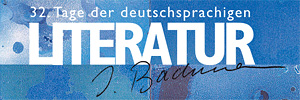
Pedro Lenz
Inland
Please, I'd like to tell you something, want to tell you, have to tell you, will tell you, so that all those long years finally disappear, far, far, far away from me.
Let me start in the village, the village I grew up in, to be precise: in the school that was only named after our neighbourhood, not after a famous educationalist, like all the other schools. It all starts at school. Up there, on the second floor.
Frank just stands there and smacks old Niederberger one in the face.
I mean, you've got to imagine it. Really, you have to get your head around that, Frank just standing there as if he were the teacher and not Niederberger, as if Frank here was the boss, the man who says what's what, our Frank, fifteen years of grief in his body, primary school, and secondary school, and hits his French teacher in the face. Like I said, you need to picture it in your head to be able to understand it a little.
The whole class dead quiet, completely frozen, the wrongly conjugated verb on the board, the Kümmerli & Frey panoramic map of Switzerland, the green felt board and next to it the giant Beatles poster that really got our goat, because even then we felt that the Beatles couldn't be the ones, with their good-weather twitterings and we would much rather have had a poster of someone like Frank Zappa, but we weren't allowed, he was a no-no, with his Bobby Brown song, which was, someone had claimed, about kinky stuff, stuff we didn't quite understand but knew must be interesting.
So everything was calm that morning, the girls and boys completely quiet. A kind of calm where even an idiot would realize that something was about to kick off, something had to kick off, sooner or later, but probably sooner.
And Frank is standing at the front, slowly he puts the chalk in his left hand, so his right hand is free and bam, he smacks him one, nasty, nasty Niederberger, who we always say oui Monsieur and non Monsieur and pardon Monsieur to, a hundred times each lesson, although his French barely sounds better than ours. Get the picture?
No one could have seen it coming, I mean none of us, except perhaps Frank himself, because he must have known, at least by the time he moved the chalk to his other hand to free up his punching hand. Show me anyone who would dare to hit his French teacher in the face, in the classroom, without having his better hand free.
Sorry, I'm starting right in the middle of things. I wouldn't want you to think I'm incapable of concentrating on the whole story. OK, ok, ok, ok, some people claim I have problems with my concentration, but they don't have a clue, don't have a clue about anything.
Collecting my thoughts, pulling myself together, I can do that, no trouble, I've proved that often enough, again and again, except perhaps once in the army when I had to disassemble and re-assemble the gun with a blindfold on, 25 times, putting all the parts on a cloth, naming them and putting them together again in the right order. Wrong! Again! Wrong again! And so on, until the lieutenant said: what a thick oaf, unbelievable, it's just not normal that someone is so thick!
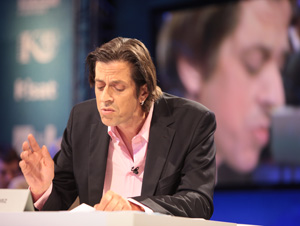
That wasn't it. I'm not thick at all. When I want to I can put anything into its logical order. But I still have to start with that morning when Frank did it, when he smacked Niederberger round the ear in front of the whole class. That might not seem important, but it is really important, because afterwards nothing was the same as it had been before, never again.
Disciplinary proceedings were started against Frank, obviously, and he was punished, it wasn't a trifle, after all, bodily harm and all, no question. Then he went into a special school, Frank did, had to go there whether he wanted to or not, the juvenile court ordered it, as a socio-educational or reform measure or whatever they called it, I don't know the exact terms any more. For these decisions the law-makers always come up with important sounding names. But for the ones who are affected, it is just punishment, full stop.
And yet, in any case, it wouldn't have gone on much longer, school, I mean, just a few more months and he'd have been out, we'd all have been out together. And probably we'd have done an apprenticeship together too, Frank and me.
Hey, do you remember? No, you wouldn't know. Many people might only have a vague memory of it, but he was interested in serious things too, Frank. Honest. He even had a go, in the autumn of 1980, with me, working at W. Bösiger, the construction company. Frank was talented, you saw that straight away. Soon he knew stuff about the ratios for mixing sand and lime, cement and water, he could remember things that I normally forgot. I'm telling it you like it is: going by his talent and his strength Frank could have been a quality bricklayer, absolutely. Once an old foreman told him he had a golden hand. You'll make a good one. That's what the foreman said. I remember, I was sitting next to them in the shed and we were eating sardines and dipping white bread into oil and I'd have been pleased to bits if a boss had said something like that to me.
Of course, maybe nothing would have come of it, even not if he had controlled himself in that French lesson and hadn't done anything to Niederberger, or if he hadn't come to school that morning, also a possibility. Because that winter Frank's dad died, that same winter, just a few days after the incident.
That was an ugly thing too. First they said it was angiopathy. A little later they said cancer, then one or two check-ups in the hospital, a few of these radiation therapies, the real thing, I mean, the ones that burn your skin, burn it painfully like a sunburn, but much worse, and then gone, bye-bye, dead, amen. That was all, happened crazily fast.
It pleased the Lord Almighty and Creator of Life to call his son away to him. That is what the obituary notice said, I've still got it, a sentence that is really difficult to understand, especially if you believe in God a bit, like I did then. You can't help asking yourself why it should please the Lord Almighty when a son suddenly has his dad die on him. That can't please anyone, not even when the dad was rarely a dad like you would hope for. I know, I know, some dads are no good, but you still don't exactly want it to please the Lord God to let them die.
Then his mother was almost happy that Frank had been sent to the special school for smacking his French teacher, at least at first, at least for herself, because she still had the little ones and the dogs and the vegetable patch and the cherry tree and cleaning jobs and, adding it all up, that gave her more than enough to do. And so it's almost understandable that a mother feels relief when her eldest and most difficult son is far away, somewhere where he would be looked after.
And supposing, just supposing for a moment, that the incident at school had never happened, then it could well have been that Frank's mother would still have said that the way things are an apprenticeship was out of the question, just because of the cost, and because she wouldn't have been able to wash his work clothes all the time, since back then, if you can remember, tenement houses had very strict laundry rotas, so that in some you could only wash once a fortnight, which particularly for people who worked for example on building sites and so got their clothes dirty a lot, was not nearly often enough, not really.
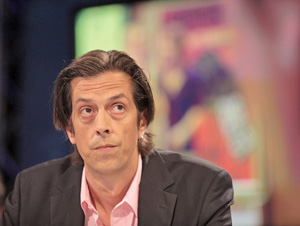
But it's also possible that they would have let him become a brickie anyway and that he would have been great, if he hadn't done that to Niederberger and nothing had happened, and he hadn't had to go to the special school. I can imagine what a laugh we'd have had, Frank and me, on the big building sites. Many a workday might have gone by much quicker.
Probably he'd have protected me at work, at least sometimes, from Dobler for example, because he was a real psycho, that Dobler, and maybe later too, in Oberglatt after the apprenticeship, after the firm's party when everyone was drunk and they pulled my trousers off and put me on the table and I thought that the best thing would be to die right there and then, like Frank's dad. But I didn't die, no, I heard what they said, all too well.
So, now let's see if our little bodging brickie has hair on his balls yet.
And then a lighter clicking and that drunken laughter that I still dream about now sometimes, until I wake up sweating and shaking and ask myself why they had to do it to me of all people, when there were so many other young brickies in the company, which was, by the way, one of the biggest in the canton of Zürich, I mean, before it was sold off.
But no, it had to be me. They did it to me. Lord, it was not nothing, it really wasn't. It was bad. Yes, it was bad, especially because everyone helped and there wasn't even one person there who even said, OK, all right, that was funny, but we'd better stop here, that's enough now. No, no one said that then, not one. They all just laughed, all of them but me.
Where was I? At the special school that Frank had to go to, not for long, but still. After that he couldn't get a training place anywhere, obviously, because of the socio-educational measure, everyone knew about it, he had to put it in his applications. And no one wanted someone like that. Although he wasn't someone like that, like they thought, at least he wasn't yet. And so he ended up at the Post Office, an unskilled job at Bern's railway depot, because back then the Post took people without an apprenticeship too and the work wasn't that badly paid, I say not badly paid, because a draughtsman in the construction trade for example, I happen to know this pretty accurately, well, a draughtsman in the construction trade earned a fair bit less after the apprenticeship than Frank without any qualification.
Sometimes we still met in those days. Don't be so soft, Frank said, and that I should have defended myself earlier, before they had drunk so much that they got the idea of pulling my trousers down and all the rest. That was true, I don't doubt he got it right, but still, it just wasn't that simple, because beforehand I didn't know what they had planned for me. And when I knew I couldn't do anything any more because they were pinning my arms and my chest down on the tabletop, three or four of them, even though I shouted and cried. Frank could have helped, but he'd been at the Post, like I said, for ages by then.
Let's forget about it, I said to Frank at the time. And today it's me, me, who said back then we should forget it, so today it's me remembering it, although I don't want to. But that, like I said, is because I still dream about it now and then.
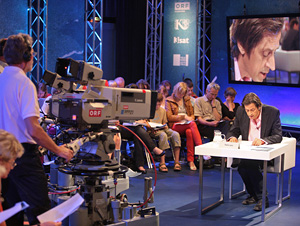
Dreams are nasty beasts. They have the most cunning memory you can imagine. I'll never understand why some people enjoy dreaming. Dreams are evil.
Maybe it's not too clever of me to only go on about Frank now. You might think that he was my only friend, while actually it isn't too clear if he even was a real friend. I just mean, nothing against him, I just want to raise the point of how difficult it is to really judge, with friendship and questions like that. Sometimes you have a friend and then notice that the person isn't really one, and sometimes it's just the opposite, although that doesn't happen as much.
Anyway, it all began when I started school in 72, the same year as Bernhard Russi became the Olympic champion in Sapporo, with a fair bit of luck actually, because Karl Schranz was the top skier that winter, an Austrian from St Anton, but he was disqualified in Sapporo, please don't ask me why. After all, there is so much that you don't understand as a child, and even later you never find out. The only mystery is why it sticks in your memory at all.
I know for example too, that Richard Nixon was the president then, in America I mean. His name was always on the radio, at lunchtime, when my dad listened to the news and we all had to keep quiet. Nixon was always named, and Brezhnev from the Russians, and sometimes Pope Paul the Sixth or Councillor Gnägi, but President Nixon most often.
Our dad would always come home shortly before the radio news, and before he sat down at the dinner table he would look through the post, in case a letter announcing a death was among them. The other letters he left until after lunch. If one was about a death, though, he would read it straight away, standing up. Then he called the person who had died a poor devil and said that it was hard to believe that this or that person had passed away too. The poor devil, and now he's died already and yet he had such a zest for life, but well, when your hour comes there is nothing you can do. Yes, yes, the reaper comes as and when he will. That's what my dad used to say. And then he'd wish us a Guten Appetit and start eating, although he must have known that our mum would have liked to say grace, which she normally then did anyway, but just quietly on her own, since my dad was never the sort of guy who went in for praying.
So that year I started school, had a kind teacher who once wrote in my report that I was polite, had tidy handwriting and was a little introverted. I didn't understand the report then, only my parents did, which didn't bother me, since it was written for them. Just that one word, introverted, even my parents didn't quite understand. So my dad asked Toni Gerber who lived one floor above us and worked in a government office and had a big dictionary. Things like that took a long time back then, I mean, finding out words and all that, it took a lot of talking.
Before that I was around too, before 72, of course. But I know that more from the photos and slides that we sometimes looked at, when my aunt who was single visited us, the only one of my dad's sisters who didn't marry, I don't know why.
I really remember my life from then, when I was going to school, not the years before that, when I can barely have thought more than a cat does as it creeps around the neighbourhood. Little children and cats don't need memory, because everything that's already happened doesn't matter to them at all. Memories begin with school, because there you start to read and write, and it's the letters that make you a real person, giving you bearings about what's behind and what's ahead. It's really like that. Without the letters you can only know what's just happened or what the others tell you, and a lot of that is lies.
I started school with Urs, Locher, who was my best friend back then, and who had a schoolbag made of black and white goatskin, then with Res, who played football so well that he could always be Günter Netzer, and that was saying something, because there were loads of others who wanted to be him. Then there was Hebel in my class too. He normally had money in his pocket, unlike the rest of us, is what I want to say. By chance Hebel stayed rich after the school years too and he still is today. If you look at it like that, nothing has changed for Hebel or for us either.
And as for the girls, I can still remember Sabine for example, which isn't difficult, because there were three or four Sabines, the name must have been in fashion then. I particularly remember one Sabine, who had pigtails and freckles and then Chantal too, who I secretly thought was beautiful and who was a little different from the other girls, although, if you see her today, but anyway, that's really not the point now.
Frank wasn't there yet, he came a year later, when his dad found a job in the weaving mill and they moved to our village, Frank and his family.
Suddenly one morning he was there. Our teacher had just led him by the hand into our room. She just didn't let go of his hand. Everyone was wondering why Fräulein Bühler didn't let go of his hand as she told us that he was Frank, that he was new in our class, and that we should be nice to him and all the other stuff that a teacher has to say when she introduces a new pupil to a class and is afraid that he might not settle in, which would mean more problems for her.
But it wasn't her not letting go of his hand. It was him! He told me that later. And I remembered how we had to read a novel in Niederberger's French class, where at the beginning someone is brought into a class and he's called Bovary and then later in the novel the poor sod's wife is in bed with someone else. That's a terribly sad novel, if I ever get round to it, I'll read it again, but probably in German, because it's too hard in French.
But even if we leave the novel out of it, not much changes. At that moment Frank entered our class, which is as much as saying: our lives, because at that time the class was of course our whole world. Over our breakfasts we'd always look forward to the moment when we would be able to tie our shoelaces and then shoot out of our flats, that back then smelled of that stuff that people used to put on the floors.
Normally the three of us went to school together, Locher, Frank and me. We lived near each other and knew every flower and piece of gravel on the way, to exaggerate a little, because of course you couldn't know every piece of gravel, certainly not in my neighbourhood, where there were so many gravel paths.
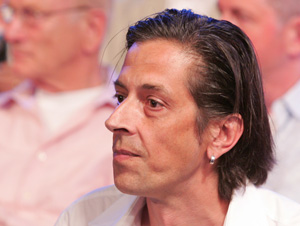
At the overflow, where the water was channelled when the stream flooded, we would always stop at first to see if something had been washed up, something valuable perhaps, gold for example or a bulging wallet. but if something was lying there after a flood, then normally just one shoe or an old Toyota hubcap or a dead rat, the sort of thing that looks promising at a first glance but still turns out to be worthless in the end.
Sometimes it contained a few crayfish though, we collected them in a plastic bucket and then brought them to school in preserving jars, which wasn't good, because Fräulein Bühler was working through beans with us and animals were scheduled for the year after next and in any case the crayfish died if you forgot them in the jars and they didn't have enough air and water.
And so, because we so rarely found anything useful in the overflow, on our free afternoons we'd either play football or be in gangs. Our gang was the Lightning Lads. I know, not very imaginative, but practical, because anyone can draw lightning, while the boys from Gruben Strasse, who called themselves White Tiger, had real difficulty when they, for example, wanted to carve a tiger into the bark of a tree. Nowadays kids don't carve things in bark as much, which must be a good thing, because it damages the trees.
But I wanted to tell you about walking to school and that there are many reason for dawdling on the way. The overflow was definitely the main one. But there was also Frau Püntener's shop. She didn't mind telling us all the prices every time we went in, even though she knew for sure that we wouldn't buy anything, except for a chewing gum or two, but even that rarely. Only Hebel could buy something substantial, a bag of sweets for example or a Buffalo Bill that by the time he gave it to us to read, looked completely dog-eared, which didn't bother us, because we weren't big on Buffalo Bill.
What wasn't on the way to school, but should still never be forgotten, are the water meadows. They were almost outside our territory as children. But we still knew them like the backs of our hands. What's more, Locher's dad had a book about the water meadows, and it said there that these meadows have been there for a long, long time, because the monks of the St Urban monastery, where there aren't any monks any more but instead a psychiatric clinic, anyway, these old monks invented the meadows. I haven't read it myself, but Locher told me.
Right, the water meadows were beautiful. By the way, they still are, because they're a conservation area. They are almost just normal fields, but they are crisscrossed by little channels and where the channels meet there are wooden sluice gates that are opened or closed, depending on whether the meadows are being watered or not. If they are, then it looks as if they're little lakes. And, by the way, that's supposed to be very good for the water table.
I especially liked the meadows in the summer, just before the grass was cut. Then it smelled so cosily secure, at least looking back. But now I don't go there any more. Only those people who have dogs go there, and I don't have one.
Frank wasn't particularly aggressive. He was like the rest of us. We scrapped sometimes, but when one person had been got down, with both shoulders flat on the ground, then the fight was over. Anyone who wanted to carry on fighting after that was held back by the others.
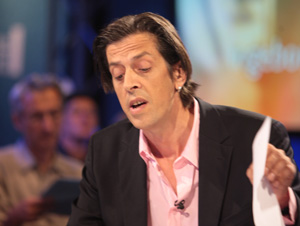
I'm just mentioning it so that you don't get impression that the incident with the French teacher had been looming for years. No, no, Frank wasn't aggressive, nor did he have a temper. Others were worse, me for example. Any little thing could make me lose it completely. Like that afternoon when I showed my friends my new bike, a Mondia Sport with a burgundy red frame and five gears. My dad had bought it for me when we went up to secondary school and so had a longer journey to school. My boy, my dad said, when I was your age, I couldn't even have dreamt of such a bike, because in my time you didn't get a bike just given to you like this, in my time nothing was just given to you. Then I nodded and got on my new bike. It was a good feeling, a feeling that you rarely have in life.
Could he take it for a spin, Res had wanted to know. Don't be so selfish, he had added and before I could say that he should be careful he was off. I was really afraid that something might happen, and something did happen in fact. When Res finally reappeared, he was carrying the bike on one shoulder, like the mountain bikers who sometimes have to get off their bikes to get past an obstacle. The fork and front wheel of my new bike were jammed together, because he had skidded in a bend on the fine sand that used to collect in those days in some bends. It was terrible and I wanted to howl with despair, because I was thinking about my dad and that he had said I had to take good care of the bike. But - and this is what really did my head in - my friends roared with laughter and even Res found it funny that he had smashed up my new bike. That's when something snapped in my head. I went for Res and probably I'd have beaten him to death if everyone hadn't jumped on me and held me back. They held me for a long time, until I had no strength left, not to shout or do anything else. Then they went off and I was left with my broken bike. And because I was feeling this enormous despair I bit one of my arms, until it bled.
What did you do to your arm? Old Hossmann, in the bike shop, asked.
I rode into a wire fence, the light was right in my eyes, I couldn't see the fence at all. How much will it cost?
We'll see. It'll be fixed by Friday. And now stop crying. Hossmann was a good man and I could pay it off working for him, because it was the holidays and he let me clean the workshop and the storerooms. That took me four days and I was glad he had believed my story about the wire fence. It's always better to look unlucky than for the whole world to know that your friends have done you harm.
There I go again, without noticing I got sidetracked, when all I wanted to say was that Frank is actually pretty calm and in control, while I myself was never able to radiate anything resembling inner peace, still can't today.
So school was going along fine, until Frank hit the teacher. From then on nothing was like it had been before. That needn't matter too much to me. But I have this feeling, I have to talk about it some more, otherwise it's never going to get better.
Translated by Stefan Tobler

